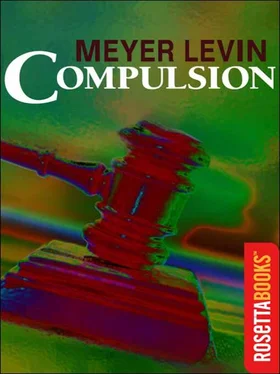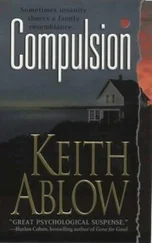And now indeed there came news of professional “dickering”. For the sake of shortening the trial, Wilk would eliminate the remainder of his sympathy witnesses, if Horn would eliminate rebuttal witnesses.
During a recess hour, the opposing attorneys were locked together. “No deal,” Horn announced as he emerged. He wouldn’t do it. He was going to put on Sergeant McNamara. The defence could do as they damn pleased.
McNamara’s material was not new. We had all printed versions of his story of Judd’s remark about “pleading guilty before a friendly judge”.
What could Horn hope to gain by putting this into the record? Did he feel that he would be putting Judge Matthewson on the spot, so that he could not dare pronounce the predicted “friendly” sentence? Did Horn feel that his alienists had been so discredited by Wilk that only a bold manœuvre could save his hanging case?
Carefully Horn led the policeman through his testimony. Had Judd become talkative with him? Had he made notes? Yes, because the case was so important. And on Sunday, May thirtieth, had Judd made any remark that struck him?
Yes, Judd had said, in discussing how he would plead, “that depends on my family – if they wish me to hang. Or else I will plead guilty before a friendly judge to get life imprisonment. There is also the insanity plea.”
Judge Matthewson sat rigid.
McNamara told how he had been so struck by the words that he had repeated them to his wife and to some neighbours on the way to church.
If Wilk had been bitter, contemptuous, in his cross-examination of Dr. Stauffer, he was now simply murderous. When had McNamara written down the remarks? Right after they were made? No, later on. When, exactly? That same day, the detective thought. Where was the notebook? He didn’t have it with him.
He didn’t? Did he think he could come into court and tell any cock-and-bull story without evidence?
The judge leaned forward. Court would be recessed. Let the notebook be produced.
An hour later, the session was resumed. McNamara produced a pocket-worn notebook, the schoolboy kind. There were entries in pencil, some half rubbed out, most of them having to do with petty expenses.
Wilk found the notations of the day of the cavalcade. Where was there anything about the “friendly judge” remark? Nothing on that day or the next.
“Then you lied,” Wilk cried. “You lied under oath before this court! You didn’t write it down that day or the next – if ever.”
McNamara sputtered. It wasn’t a lie. He hadn’t said exactly when he wrote it down.
In a tangle of questions, Wilk had him stumbling over his own tongue, on the point of violence or tears. McNamara pointed out notations on a later page. “Insanity plea, or get a life sentence from a friendly judge.”
Jonathan Wilk was relentless. How could anyone know these were Judd’s words? Couldn’t they be McNamara’s own conclusions? Couldn’t he have put them in recently, even today? Hadn’t a newspaperman invented the whole story?
McNamara shouted, “That’s a lie!” Reprimanded by the judge, he sputtered the names of the neighbours to whom he had told the story, then, in repeating the wording, got the quotation wrong. Finally he admitted, No, he wasn’t sure of the exact quotation.
“Or if there was a quotation at all!” Wilk snapped. But he wasn’t done with his prey. And what did the phrase “friendly judge” mean? Even if Judd had said it, couldn’t he have meant that a jury would be unfriendly, after being stirred up by wild campaigns to creatre prejudice? Was McNamara not only a note-taker but a mind-reader?
Sweating, the policeman growled, “No, I’m not that smart, not as smart as any million-dollar lawyers.”
Wilk looked up at Judge Matthewson. There it all was. They were bracketed together, in prejudiced minds. A million-dollar lawyer before a judge who would be friendly to millionaires.
McNamara lurched from the stand.
Thus on this note of hatred, the testimony ended; the case that was to explore our deepest philosophies, free will, guilt, and compulsion, closed with charges and countercharges of lying, shouts of money influence, with prejudice-stirring, with words bitter and base that were yet to reach into the last moment of the trial.
I WONDER WHETHER in all courtroom history the speaking effort of one man was ever awaited as was the speech of Jonathan Wilk for the defence of Steiner and Straus. Perhaps there was in this anticipation the sense that all the probings, all the expert testimony, had still fallen short of an explanation, and that only the ultimate effort of a great man could lift the meaning before us.
I kept wondering about Wilk in another way. For weeks he had been striving with all his might for these two boys in the crowded, dense, boiling courtroom. Yet, though Judd in particular seemed always to be trying to reach him with his gaze, Wilk did not appear to respond. It was as though Wilk defended them on principle, even, perhaps, against an inner sense of revulsion. His summation would have to be virtually an abstract plea for pure mercy, then.
And surely it would be the last great murder trial in which the tired, ageing Wilk would take part; never again could such extreme circumstances arise. Pure mercy – for murder, pure, without even a concomitant sense of guilt.
So Padua pictured the killing, as he took the first turn at summation, speaking smoothly, convincingly, reciting the law from Blackstone to our own day, precedent after precedent proving that hanging and only hanging, only the extreme penalty, was called for. Mitigation? For what? For their superior intelligence? For their superior advantages in wealth and luxury? For their waste of life, for destroying other lives as well as their own? No, as long as the death penalty existed in human law, it was mandatory in a case of this kind.
Then Ferdinand Feldscher spoke for the defence, proving by precedent after precedent that consideration of the youth and mental condition of the defendants should bring a jail sentence. A hanging would be atavistic. And he awakened a sympathy for himself; we could not forget that he was a relative. And through sympathy for him, there was sympathy for the boys.
The next day came Czewicki’s turn. It was a memorized speech filled with gruesome images piled one on the other; the effect was like turning the pages of an illustrated Inferno . His task was to deal with the psychiatric testimony, and his burden was that it was a virtual hoax, since the defendants were admittedly legally sane. Mad dogs were suffering from illness, but not these pervert prodigies, these vicious lust-killers.
To him, Edgar Feldscher replied, reviewing the entire relationship of psychiatry and criminal law and urging, earnestly, that the tragic case yield, for humanity, a further step in the use of the new science as an aid to justice. Of all who had spoken until then, he touched us most, for there was a deep perplexity in him, and even more than had been felt from his brother, an unashamed personal concern for the defendants. When Edgar Feldscher turned toward them in his plea that their lives were young, that one or the other, sick as they were, might yet have much to give, his voice lost its pitch. He ended by recalling that it had been the wish and hope of the defence that both sides should participate in the psychiatric study; it was still his wish and hope that the use of such knowledge should prevail, in place of oratory, in man’s search for justice.
There remained only Wilk and Horn.
Although only one individual, Judge Matthewson, would render the verdict, the trial was not a play rehearsed behind a dropped curtain. The entire world had become a jury. Thousands of letters, telegrams, petitions, even death threats, inundated the court. Could Wilk move enough feeling, literally sway it, to the side of pity?
Читать дальше












